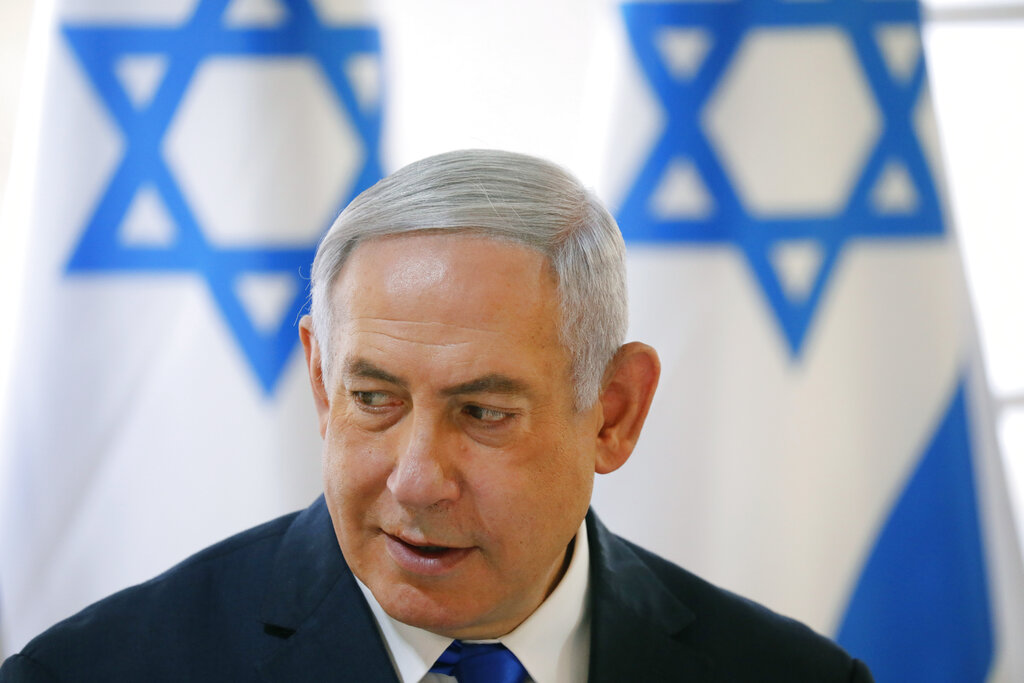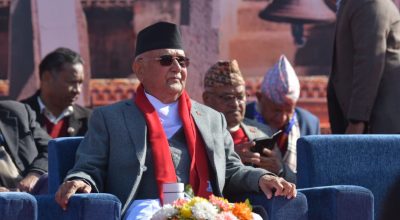
JERUSALEM, Sept 18, 2019 (AP) — Israeli Prime Minister Benjamin Netanyahu fell short of securing a parliamentary majority with his religious and nationalist allies in national elections Tuesday, initial exit polls showed, setting the stage for a period of coalition negotiations that could threaten his political future and clear the way for him to be tried on corruption charges.
Initial results posted by Israel’s three major television stations showed challenger Benny Gantz’s centrist Blue and White party tied or with a slight lead over Netanyahu’s Likud. While the results do not guarantee that Gantz will be the next prime minister, they signaled that Netanyahu, who has led the country for over 10 years, could have trouble holding on to the job.
Addressing his supporters early Wednesday, Netanyahu refused to concede defeat and vowed to work to form a new government that excludes Arab parties. His campaign focused heavily on attacking and questioning the loyalty of the country’s Arab minority — a strategy that drew accusations of racism and incitement from Arab leaders.
“In the coming days we will convene negotiations to assemble a strong Zionist government and to prevent a dangerous anti-Zionist government,” he said. He claimed that Arab parties “negate the existence of Israel as a Jewish and democratic state” and “glorify bloodthirsty murderers.”
Israeli exit polls are often imprecise, and final results, expected Wednesday, could still swing in Netanyahu’s favor. But all three stations predicted a similar outcome.
According to those polls, neither Likud nor Blue and White, with their smaller respective allies, could control a majority in the 120-seat parliament without the support of Avigdor Lieberman’s Yisrael Beitenu party. That put Lieberman, a former protege of Netanyahu’s who has become one of the prime minister’s fiercest rivals, in the position of kingmaker.
Arab parties, which have never before sat in an Israeli government, also finished strong, and exit polls predicted they would form the third largest party in parliament.
Addressing his supporters late Tuesday, a jubilant Lieberman said he saw only “one option:” a broad, secular coalition with both Blue and White and Likud.
“We’ve always said that a unity government is only possible in emergency situations. And I tell you and I tell every citizen today watching us on television: the situation, both security-wise and economically, are emergency situations,” he said. “The country, therefore, requires a broad government.”
Early Wednesday, Gantz told a cheering rally of supporters that while it was too soon to declare victory, he had begun speaking to potential partners and hoped to form a unity government.
“Starting tonight we will work to form a broad unity government that will express the will of the people,” he said.
Attention will now focus on Israel’s president, Reuven Rivlin, who is to choose the candidate he believes has the best chance of forming a stable coalition. Rivlin is to consult with all parties in the coming days before making his decision.
After that, the prime minister designate would have up to six weeks to form a coalition. If that fails, Rivlin could give another candidate for prime minister 28 days to form a coalition. And if that doesn’t work, new elections would be triggered yet again. Rivlin has said he will do everything possible to avoid such a scenario.
Lieberman called for an immediate start to negotiations and predicted it could be wrapped up quickly. But such a deal promises to be complicated.
Gantz, a former military chief who has presented himself as a unifying figure in a divided nation, has ruled out a partnership with Likud if Netanyahu remains at the helm at a time when he is expected to be indicted on criminal charges.
But in his speech, he made no such conditions. “I intend to speak with everyone,” he said, without mentioning Netanyahu.
Lieberman, who leads a nationalist but secular party, is unlikely to sit with Arab parties on the left or ultra-Orthodox religious parties on the right.
That could limit both Gantz’s and Netanyahu’s ability to maneuver and could potentially put pressure on the longtime leader, who has ruled for over a decade, to step aside.
Likud members said they remained behind their leader.
“We have the basic principal of standing by the party leader who was elected in the party primary, which is why we won’t take action against Netanyahu,” said lawmaker Micky Zohar, a Netanyahu loyalist.
Netanyahu had sought an outright majority with his allies in hopes of passing legislation to give him immunity from the expected indictment.
Israel’s attorney general has recommended charging Netanyahu with bribery, fraud and breach of trust in three scandals, pending a hearing scheduled next month. A formal indictment would increase the pressure on Netanyahu to step aside if he does not have immunity.
Netanyahu tried to portray himself as a seasoned statesman uniquely qualified to lead the country through challenging times during an alarmist campaign marked by mudslinging and slogans that were condemned as racist. Gantz tried to paint Netanyahu as divisive and scandal-plagued, offering himself as a calming influence and honest alternative.
Netanyahu’s campaign promoted images of him jetting off to world capitals and boasting of warm relations with powerful leaders, most notably President Donald Trump.
At the same time, he issued repeated doomsday warnings that his opponents were scheming with politicians from the country’s Arab minority to “steal” the election.
He tried, and failed, to pass legislation that would allow cameras in polling stations, a step he said was needed to crack down on alleged fraud in Arab towns. Facebook suspended his account for 24 hours last week after it published a post saying that “Arabs want to annihilate all of us.”
Netanyahu also sought to appeal to his hardline base with a number of election promises, including plans to annex all of Israel’s settlements in the West Bank.
His proposal, which could extinguish any remaining hopes for a Palestinian state, were condemned by much of the world, including important Arab countries like Jordan and Saudi Arabia. But the U.S. remained muted, suggesting he had coordinated with Washington ahead of time.
Netanyahu’s frenetic warnings about Arabs appeared to backfire, turning off some Jewish voters and driving heavy turnout in the Arab sector.
Ayman Odeh, leader of the main Arab faction in parliament, said Netanyahu’s repeated attacks had boosted turnout and hurt Netanyahu in the end.
“There’s a heavy price to pay for incitement,” he told Channel 13 TV.
The election was Israel’s second of the year.
In April’s vote, Netanyahu appeared to have the upper hand, with his traditional allies of nationalist and ultra-religious Jewish parties controlling a parliamentary majority.
But Lieberman, his mercurial ally-turned-rival, refused to join the new coalition, citing excessive influence it granted the ultra-Orthodox Jewish parties. Without a parliamentary majority, Netanyahu dissolved parliament and called a new election.
Lieberman’s gamble paid off Tuesday, and exit polls suggested his party had nearly doubled in strength, to as many as 10 seats.
Israel’s election commission said 69.4% of all eligible voters cast ballots by the time polls closed on Tuesday evening, a slightly larger number than took part in April’s vote. Turnout in April’s elections was 68.5%.
















